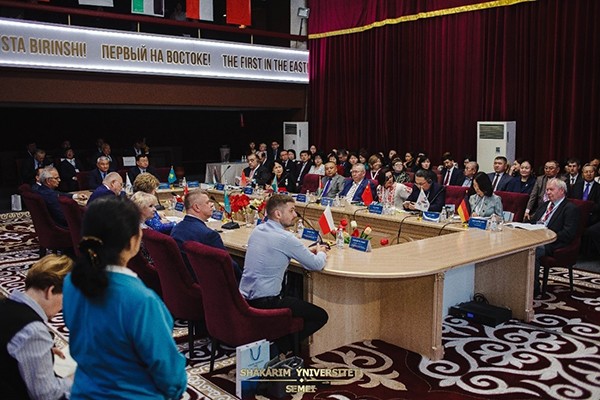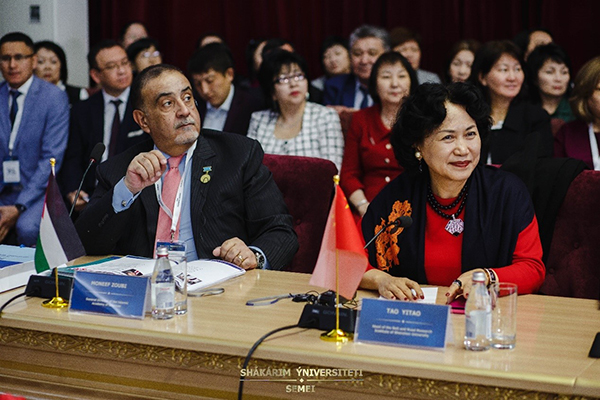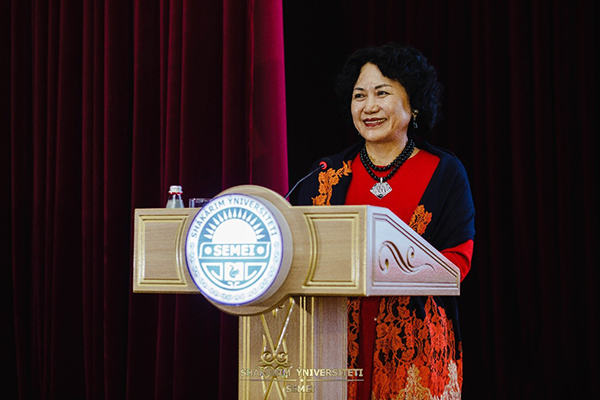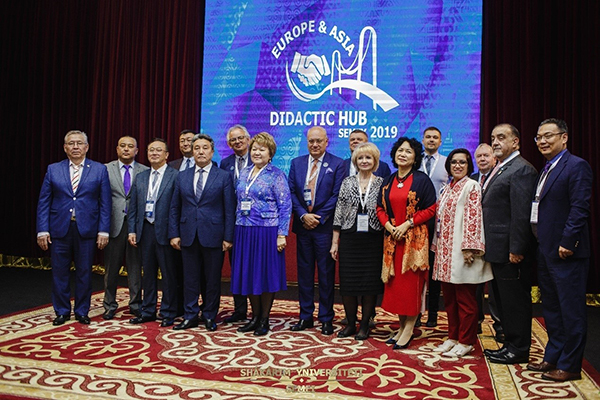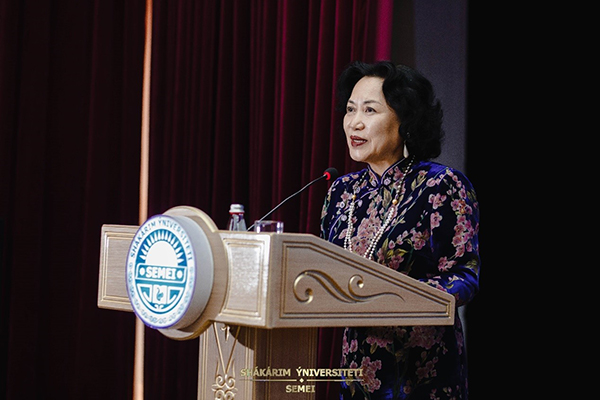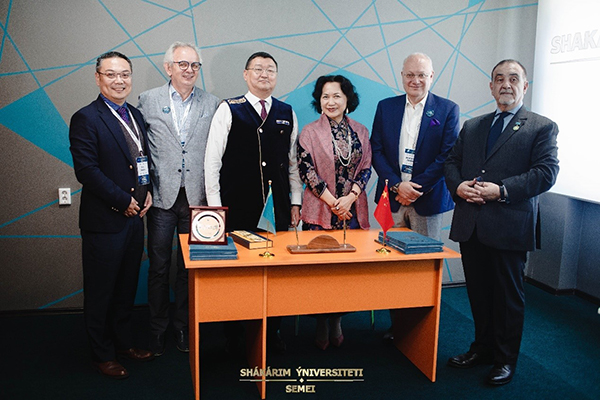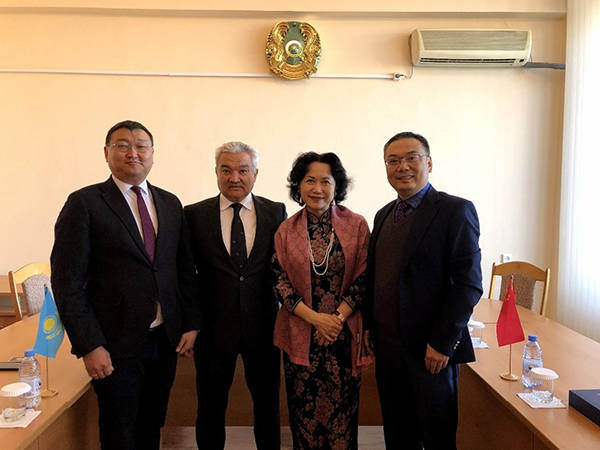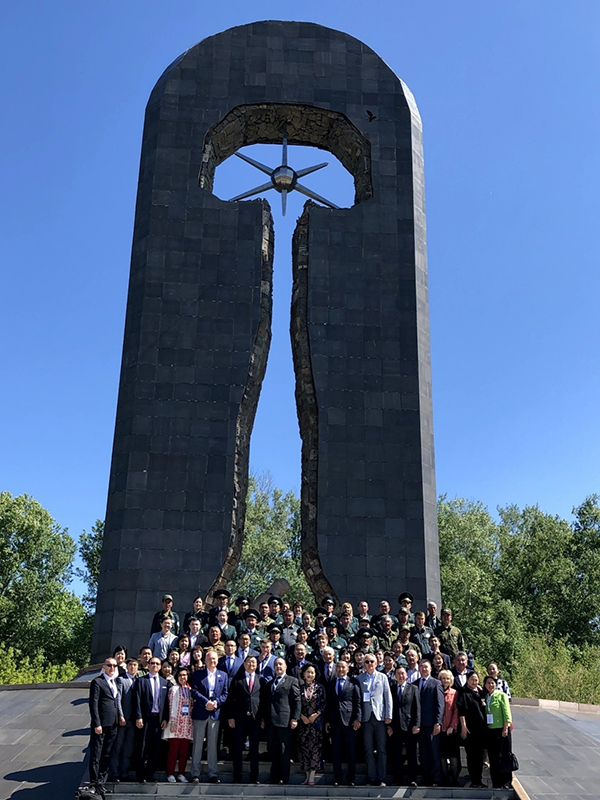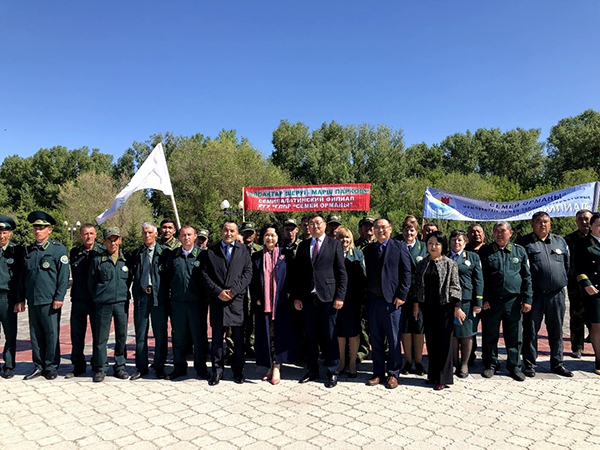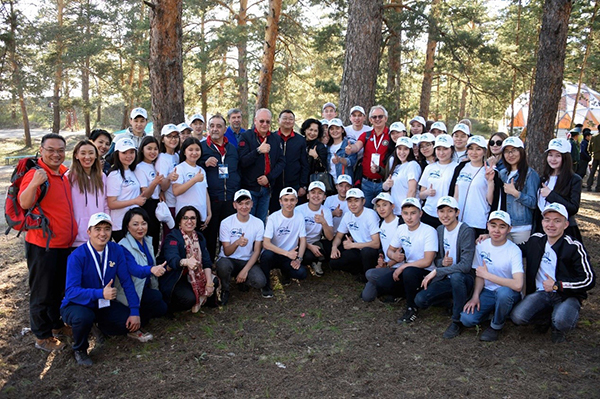From May 24 to 30, 2019, at the invitation of Meir Yeskendirov, Rector of Shakarim University (SU), Semei, Kazakhstan, Prof. Tao Yitao, director of the China Center for Special Economic Zone Research (CCSEZR), Shenzhen University (SZU), a key research base for humanities and social sciences under the Ministry of Education, president of the Belt and Road Research Institute (BRRI) of SZU and president of the Belt and Road Research Institute (Shenzhen) for International Cooperation and Development (BRRIICD) attended the “2019 Eurasia Education Hub” Forum at SU with associate researcher Dr. Yun Wenjie, and Prof. Tao Yitao delivered a keynote speech. During the visit, Director Tao Yitao signed the student exchange program agreement with SU on behalf of SZU, and entered into the agreements on the establishment of SU Joint Training Base of SZU Theoretical Economics Postdoctoral Research Station and the SU Branch of BRRIICD. Meanwhile, Prof. Tao Yitao attended the inauguration ceremony of these two institutions and other academic exchanges.
“Eurasia Education Hub” Forum is an international academic meeting on education that is held annually to explore and share global education philosophies against the backdrop of globalization, promote cross-national exchanges on educational thoughts and practices, and ultimately facilitate win-win cooperation between countries in education. This year marked the 3rd anniversary of the Forum. Among the attendees were experts and scholars from Switzerland, Poland, Ukraine, Jordan, Russia and South Korea. The BRRI and BRRIICD are among the Forum chair’s organizations.
Situated in Central Asia, deep in the Eurasian continent, the Republic of Kazakhstan is the hub of material and cultural exchanges between Asia and Europe. As a former Soviet Socialist republic, the country has long-standing and close historical and cultural links with China. With a vast territory and abundant resources, Kazakhstan enjoys a high level of mass education, social stability and economic prosperity. Since its independence in 1990s, Kazakhstan has maintained a friendly relationship with China. In recent years, with China’s rising heft in the world, Kazakhstan’s government and academic community intend to strengthen the cooperation between the two countries, hoping to lift the barriers caused by its geopolitical isolation. To achieve that goal requires a large number of talented people who understand China’s language, culture, history and present situation. The universities and think tanks in Kazakhstan are charged with the mission to foster such talent.
Located in Semei (formerly known as Semipalatinsk), a city in East Kazakhstan, SU is one of the largest and oldest multi-disciplinary public universities in Kazakhstan. Among the oldest and most culturally vibrant city in Kazakhstan, Semei is a hub of the Silk Road Economic Belt, with railways connecting Russia, Kazakhstan and China, and the Eerqisi River which originates from China and runs through to Russia via Kazakhstan. SU boasts adequate infrastructure and a broad range of academic disciplines, including Mechanical Engineering, Machine Manufacturing, Computer Science, Food Engineering, Agriculture, Veterinary Science, Ecology and Environmental Protection, Economics and Finance, Law and Social Science, Management Science, Accounting, Architecture, Art and Design, Education and Pedagogy and so on. It is devoted to supplying both East Kazakhstan and the country at large with innovative professionals in all fields who can think critically and connect with the world using modern technologies. On the occasion of the Belt and Road Initiative (BRI), Meir Yeskendirov, Rector of SU, hopes the cooperation between SU and SZU will promote exchanges between Semei and Shenzhen, and thus foster modernization of universities and cities.
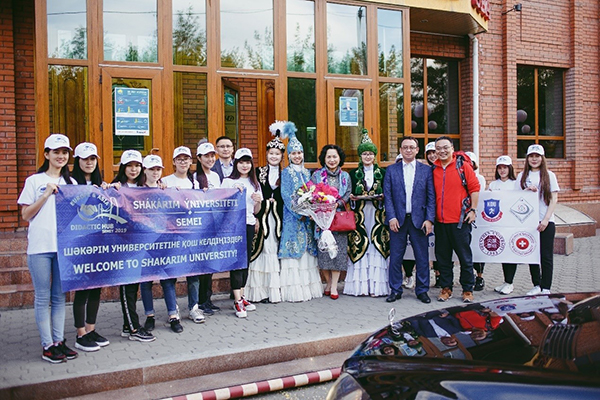
Teachers and students of SU warmly welcome Prof. Tao Yitao's delegation
On May 26, 2019, Prof. Tao Yitao and Yun Wenjie attended the “2019 Eurasia Education Hub” Forum sponsored by SU. At the opening ceremony, Prof. Tao Yitao delivered a speech titled Shenzhen: A City of Miracles and Yun Wenjie was the interpreter. She introduced the development history of Shenzhen SEZ at the forefront of China's reform and opening-up, and summed up the experience of Shenzhen’s modernization. Other scholars from Europe and Asia also delivered speeches to introduce the education philosophies in their respective countries, and emphasized the importance of achieving cultural tolerance and communication through education in the current international environment. In the roundtable discussion, Prof. Tao Yitao and Yun Wenjie shared their ideas for intercultural education and Eurasia educational cooperation with participating principals and scholars from Switzerland, Poland, South Korea, Russia, Jordan and so on.
SU sponsors the 2019 Eurasia Education Hub Forum
Prof. Tao Yitao attends the 2019 Eurasia Education Hub Forum
Prof. Tao Yitao delivers a speech at the 2019 Eurasia Education Hub Forum
Group photo of Prof. Tao Yitao with international scholars at the 2019 Eurasia Education Hub Forum
Prof. Tao Yitao and Dr. Yun Wenjie also visited Prof. Amerkhan Rakhimzhanov, Director of the Library of the First President of the Republic of Kazakhstan, and reached a consensus on exchanges of books and materials between SZU and the Library from time to time. Prof. Tao Yitao presented Special Economic Zones and China’s Path and Journal of the Belt & Road Studies (Issue 1, 2018) published by BRRI to the Library. Prof. Amerkhan Rakhimzhanov gave Prof. Tao Yitao the Nursultan Nazarbayev Biography and Nursultan Nazarbayev Sayings in return.
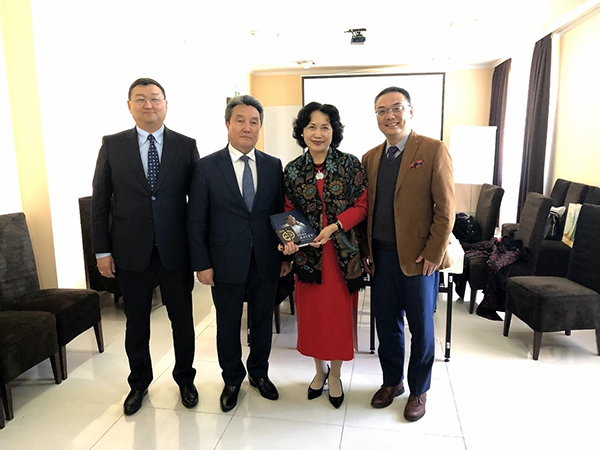 Prof. Tao Yitao’s delegation has a meeting with Prof. Amerkhan Rakhimzhanov, Director of the Library of the First President of the Republic of Kazakhstan.
Prof. Tao Yitao’s delegation has a meeting with Prof. Amerkhan Rakhimzhanov, Director of the Library of the First President of the Republic of Kazakhstan.
On the morning of May 27, 2019, a book giving and presentation activity arranged by Meir Yeskendirov, Rector of SU, for Prof. Tao Yitao and CCSEZR took place. The books presented by CCSEZR included: China’s Economic Zones: Design, Implementation, and Impact, Special Economic Zones and China’s Path, Studies on China’s Special Economic Zones, Journal of the Belt & Road Studies, and Annual Report on the Development of China’s Special Economic Zones (Blue Book).
Following the activity, Prof. Tao Yitao delivered a speech titled The Significance and Value of Inclusive Development, with Yun Wenjie as the interpreter. Prof. Tao affirmed the importance of inclusive development in the current international situation. Human civilizations and countries should respect each other’s culture, traditions and social systems, and be tolerant of each other’s development modes. International education is an important means to help people around the world overcome institutional and cultural barriers. Only with an inclusive and exercisable institution-cultural cognition system in place, can we get rid of the constraints caused by existing customs, beliefs and values to establish common values and rules shared across the world. The speech of Prof. Tao was highly appreciated by participating European and Asian scholars. Particularly, Prof. Zobi, an expert in the history of Islamic science and technology and Arab literature from the University of Jordan, together with his wife, spoke highly of Prof. Tao’s opinions about mutual respect among civilizations and inclusive development.
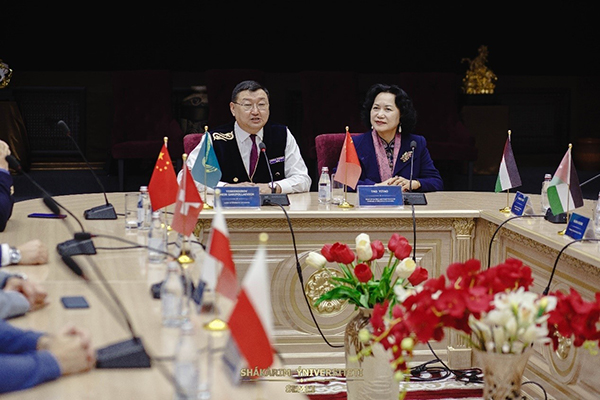
Rector Meir Yeskendirov and Prof. Tao host the book giving ceremony
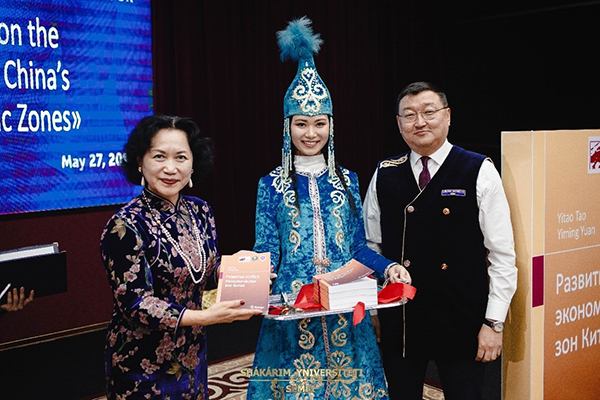
Prof. Tao Yitao presents books to Rector Meir Yeskendirov
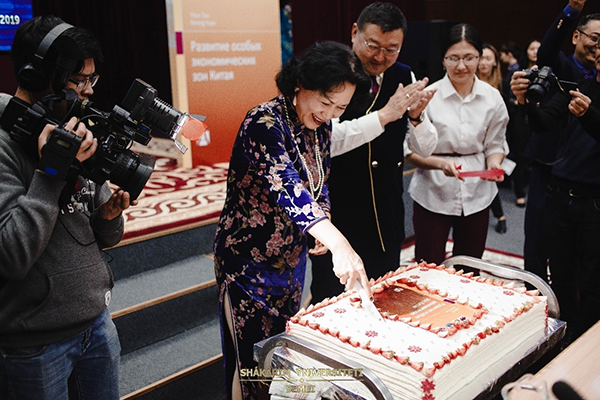
Prof. Tao Yitao cuts the ceremonial cake according to Kazakhstan custom
Prof. Tao Yitao delivers a keynote speech titled The Significance and Value of Inclusive Development
After the meeting, Rector Meir Yeskendirov hosted the inauguration ceremony of the SU Branch of BRRIICD. Prof. Tao Yitao signed the student exchange agreement with Rector of SU on behalf of President Li Qingquan of SUZ, the agreement on the establishment of the postdoctoral research station base between CCSEZR and SU and the cooperation agreement between BRRIICD and SU. Mr. Meir Yeskendirov, Rector of SU, and Ms. Naila, Head of the International Office of SU said that the BRI provided a good opportunity for students and scholars from China and Kazakhstan to exchange with each other. SU should take full advantage of this opportunity to deepen China-Kazakhstan relations by enhancing its academic cooperation with SZU.
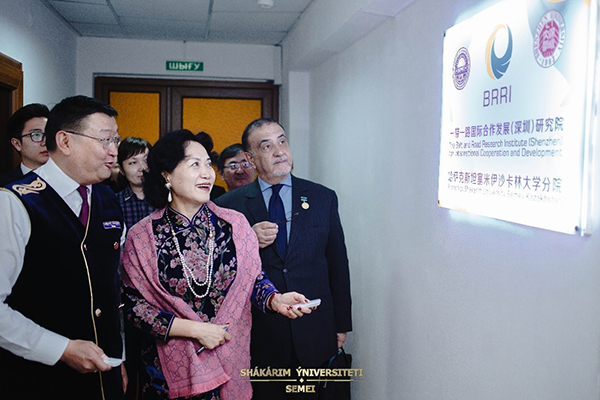
The inauguration ceremony of the SU Branch of BRRIICD
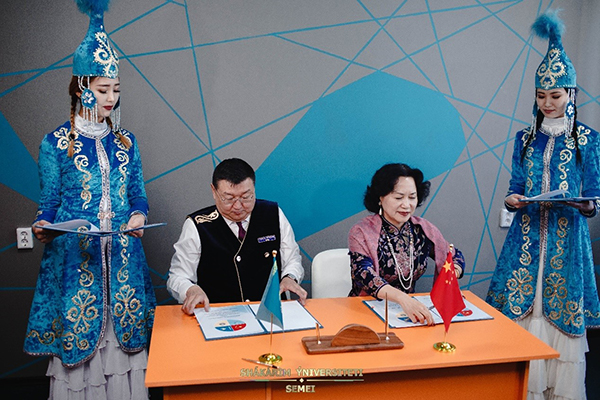
Prof. Tao signs the cooperation agreement with Rector Meir Yeskendirov
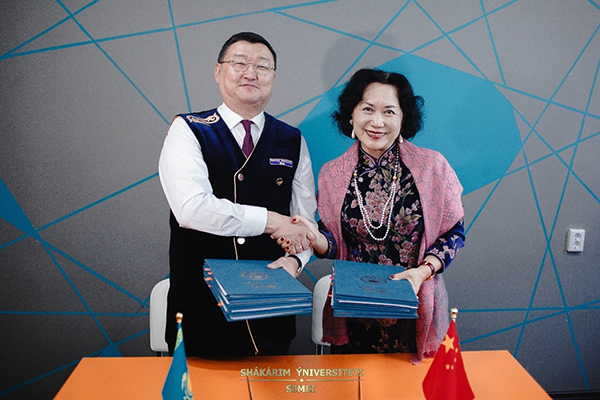 Prof. Tao signs the cooperation agreement with Rector Meir Yeskendirov
Prof. Tao signs the cooperation agreement with Rector Meir Yeskendirov
Participating scholars from Poland, Switzerland and Jordan witness the cooperation between China and Kazakhstan
On the afternoon of May 27, 2019, Prof. Tao Yitao and Dr. Yun Wenjie met with Mr. Salimov (the Mayor of Semei) in the city hall, and the two sides exchanged souvenirs. Mr. Salimov said that Kazakhstan connected Xinjiang province in China and the Caspian Sea region, and Semei was a vital transport hub of the Silk Road Economic Belt. Although Eurasian overland trade has been greatly weakened by maritime transport, the BRI gives new momentum to Semei, located deep in the Eurasian continent. He hoped that Semei could build a much closer relationship with Shenzhen to introduce new thoughts, ideas, technologies and culture to Kazakhstan more conveniently. At the same time, students and scholars from SU were expected to bring diverse thoughts and cultures to Shenzhen to help building it into an international city in the Guangdong, Hong Kong and Macau Greater Bay Area.
Prof. Tao Yitao’s delegation meets with Mr. Salimov, the Mayor of Semei
After the meeting, Prof. Tao and her delegation participated in the tree planting activity organized by SU in memory of the victims of the Semipalatinsk Nuclear Test and to pray for peace and safety of humankind in the Semei Forest Park. Prof. Tao Yitao further communicated with the students of SU during the activity.
Group photo of participating scholars in front of the Semipalatinsk Nuclear Test Monument
Prof. Tao Yitao’s delegation participate in the tree planting activity in Semei
Group photo of Prof. Tao Yitao’s delegation and SU students
During this visit to Kazakhstan, Prof. Tao and her delegation were not only stunned by the vast, splendid Kazakh Steppe, but also impressed by the eagerness of Kazakhstan academic community to strengthen China - Kazakhstan communication. Deeply affected by Russian culture, Kazakhstan has been swinging between European and Asian culture. European culture had played an important role in leading Kazakhstan’s social progress. In recent years, as the BRI progresses, Kazakhstan attaches even greater importance to the cooperation with the eastern world, especially China. Its diplomatic strategy has been adjusted accordingly. To China, the cooperation with Kazakhstan as an important neighbor with long-lasting relations with China is important in ensuring stability in northwest China and developing the Silk Road Economic Belt. With changes of international situation and adjustment of national policies, China will play an even greater role in leading the modernization of Asian countries. Even though Shenzhen on the coast of Southern China and Semei on the vast steppe in Kazakhstan, are miles apart, students and scholars in SZU and SU come together for a common pursuit of technological innovation and joint development. The impetus behind is what Prof. Tao Yitao has pointed out in her speech: Cultural tolerance and inclusion are a good way for the community to cope with changes outside because they drive the culture to evolve in a way to settle conflicts and reduce trade costs. The BRI is definitely not a short-term project, but a great move that will change the global economic and political landscape. To implement the BRI, the most urgent task is to build mutual trust among countries, which can be achieved by inclusive culture and values. And only in way, can diverse civilizations and culture create resources and wealth. Guided by the principle of inclusive development, the BRI will enable China and rest of the world to create more opportunities for each other.

